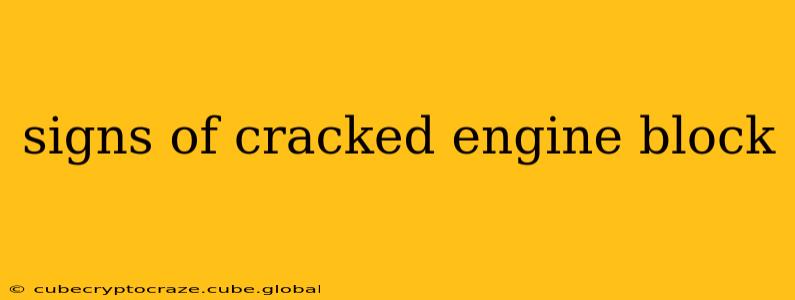A cracked engine block is a serious problem that can lead to significant engine damage and costly repairs. Identifying the signs early is crucial to prevent further complications and potentially save you a lot of money. This guide will explore the various ways a cracked engine block can manifest itself, helping you understand what to look for and when to seek professional help.
What is an Engine Block?
Before delving into the signs of a cracked engine block, let's briefly define what it is. The engine block is the main structural component of an internal combustion engine. It houses the cylinders, crankshaft, and other vital parts. A crack in this crucial component compromises the engine's integrity and can lead to catastrophic failure.
Common Signs of a Cracked Engine Block
Several indicators can signal a potential crack in your engine block. Not all of these signs definitively mean a cracked block, but their presence warrants immediate investigation by a qualified mechanic.
1. White Smoke from the Exhaust
One of the most noticeable signs of a cracked engine block is the presence of white smoke emanating from the exhaust pipe. This smoke is often accompanied by a sweet, coolant-like smell. This is because coolant is leaking into the combustion chamber, mixing with the exhaust gases and creating visible white smoke.
2. Loss of Coolant
If you're consistently topping up your coolant, it could indicate a leak. While a leak can stem from various sources, a cracked engine block is a significant possibility, especially if you can't visually locate the leak.
3. Overheating
A cracked engine block can impede the efficient circulation of coolant, leading to engine overheating. This can manifest as an overheating warning light on your dashboard or a noticeable increase in engine temperature.
4. External Leaks
You might observe coolant leaks around the engine block itself. This can be a visible stream or a more subtle weeping of coolant. Look carefully for stains or signs of moisture around the block's junctions and crevices.
5. Oil and Coolant Mixing
A crack might allow the mixing of engine oil and coolant. This results in a milky, mayonnaise-like substance in the oil. Checking your dipstick regularly can help you spot this crucial sign early.
6. Engine Misfires or Reduced Performance
A cracked block can disrupt the engine's compression, leading to misfires, reduced power, or rough idling. This is often accompanied by a noticeable decrease in fuel efficiency.
7. Low Compression
Low compression in one or more cylinders is a strong indicator of a problem. A cracked block can cause a loss of compression as gases escape through the crack. A compression test by a mechanic can confirm this suspicion.
8. Bubbles in the Radiator
When the engine is running, observe the radiator. The presence of bubbles indicates pressure build-up, which can be caused by exhaust gases entering the cooling system through a crack in the block.
9. External Cracks (Visible Cracks)
In some cases, a crack might be visible on the engine block's exterior. Carefully inspect the engine block for any signs of cracks, especially around the cylinder head gasket and near the freeze plugs.
How to Diagnose a Cracked Engine Block
Diagnosing a cracked engine block requires professional expertise. While some signs are readily observable, confirming the diagnosis necessitates a thorough inspection and potentially pressure testing by a qualified mechanic. They will likely utilize specialized tools and techniques to pinpoint the location and extent of any damage.
What Causes a Cracked Engine Block?
Several factors can contribute to a cracked engine block, including:
- Overheating: Extreme overheating can cause the engine block to warp and crack.
- Freeze Damage: Water expanding during freezing temperatures can put immense pressure on the block, resulting in cracks.
- Corrosion: Over time, corrosion can weaken the engine block, making it more susceptible to cracking.
- Manufacturing Defects: In rare cases, manufacturing defects can create weaknesses that eventually lead to cracks.
- Physical Damage: Impact from accidents or external forces can also cause cracks in the engine block.
Is a Cracked Engine Block Repairable?
The repairability of a cracked engine block depends on several factors including the size, location, and nature of the crack. Smaller cracks might be repairable through welding or specialized epoxy solutions. However, larger or more complex cracks often necessitate engine replacement. A mechanic can assess the damage and determine the best course of action.
This comprehensive guide should provide you with the necessary information to recognize the potential signs of a cracked engine block. Remember, early detection is key to minimizing costly repairs. If you suspect any of these issues, seek professional advice from a qualified mechanic immediately. Ignoring the problem could lead to serious engine damage and potentially expensive repairs or even a complete engine replacement.
